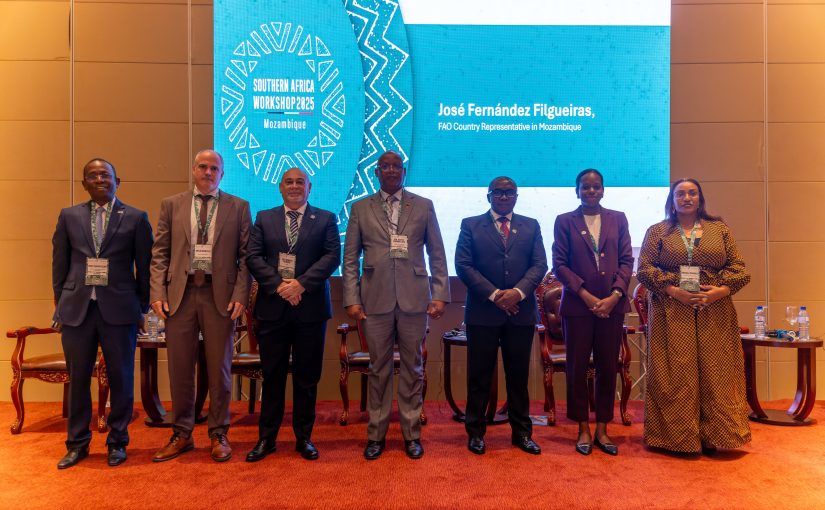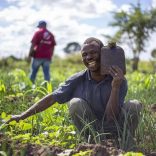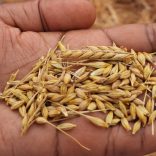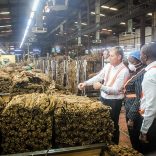Mozambique: MAAP and CTA align priorities to boost agribusiness and fisheries
Government of Mozambique, FAO and partners convene regional workshop in Mozambique to advance sustainable management of dryland landscapes

Photo: FAO Mozambique/X
The Food and Agriculture Organization of the United Nations (FAO), in collaboration with the Government of Mozambique, the African Forest Forum (AFF) and development partners, opened on Monday the Third Regional Stakeholders Workshop for Southern Africa of the Sustainable Forest Management Impact Program on Dryland Sustainable Landscapes, funded by the Global Environment Facility (GEF).
Co-organized with the program executing partners – the International Union for the Conservation of Nature (IUCN) and the World Overview of Conservation Approaches and Technologies (WOCAT) – as well as region-specific technical knowledge hubs such as the International Institute of Rural Reconstruction (IIRR), the Community Technology Development Trust (CTDT), the Collaborative Partnership on Forests (CPF) and the International Institute for Environment and Development (IIED), the event is being held in Maputo from 29 September to 3 October 2025. It brings together more than one hundred stakeholders across sectors to advance sustainable land management and climate resilience. Participants include government officials, technical partners, project implementers, international organizations, civil society, academia and the private sector.
This year’s workshop focuses on scaling up impactful interventions for the sustainable management of the Miombo-Mopane ecoregion, home to over 100 million people and one of the world’s most significant biodiversity hotspots.
Participants will exchange knowledge, assess progress and identify new partnerships to tackle pressing challenges such as land degradation, deforestation, drought and biodiversity loss. This underscores the urgent need for coherent, cross-sectoral policy frameworks that integrate forests with related sectors such as agriculture, water, mining and energy. Such integrated approaches are essential to meeting global commitments to halt and reverse deforestation, and to advancing global goals on forests, biodiversity, climate, and land degradation neutrality.
The workshop will also reinforce the critical role of the Southern Africa Development Community (SADC) in facilitating regional dialogue and coordination, ensuring alignment with regional priorities for climate resilience, biodiversity conservation and land degradation neutrality.
Mozambique’s leadership in sustainable land management
As host country, Mozambique is showcasing its leadership in regional conservation and restoration efforts. Initiatives such as the Global Environment Facility (GEF) MozBio program, the Transboundary Miombo Project supported by FAO and the Government of Italy, and the Maputo Declaration on the sustainable management of the Miombo woodlands, demonstrate the country’s commitment to balancing biodiversity protection with rural development and climate resilience.
A multi-stakeholder platform for sustainable solutions
Over five days, the workshop will feature:
- A field visit to highlight Mozambique’s conservation achievements and community-based resource management.
- A Private Sector Day to connect producers, investors and financial institutions to build climate-resilient supply chains.
- A Policy Exchange Day with the Collaborative Partnership on Forests (CPF) for experience-sharing on policy tools and best practices that strengthen cross-sectoral collaboration for sustainable forest management.
- A regional day to consolidate collaboration through the SADC Great Green Wall Initiative (GGWI) and the Miombo Initiative.
Building resilience for people and ecosystems
The GEF-7 Sustainable Forest Management Impact Program on Dryland Sustainable Landscapes, implemented by FAO with IUCN and WOCAT, operates in 11 countries across Africa and Central Asia. In southern Africa, the program aims to safeguard the integrity of the Miombo and Mopane Woodlands. By promoting sustainable land management, the programme will improve the livelihoods of one million people and restore 12 million hectares of degraded land.
Speaking on behalf of the Global Environment Facility (GEF), Asha Bobb-Semple, reaffirmed the global ambition to achieve Land Degradation Neutrality while renewing GEF’s commitment to supporting the DSL-IP programmatic and integrative efforts and partner countries.
Patrice Talla, FAO Subregional Coordinator for Southern Africa and FAO Representative in Zimbabwe, underscored the urgency of collective action, noting that ‘’Drylands face immense pressures, but they also hold tremendous potential. Through strategic restoration, harmonized policies, and strengthened cross-border collaboration, we can transform degraded landscapes into resilient ecosystems, safeguard and revitalize biodiversity, enhance climate adaptation, and improve the livelihoods of millions.’’
Sibongile Mavimbela, Programme Officer at SADC, underscored the alignment of the DSL-IP with the GGWI and the Maputo Declaration, highlighting a unique opportunity to accelerate progress on land restoration, biodiversity conservation, and sustainable livelihoods in shared ecosystems.
The FAO Country Representative in Mozambique, José Luis Fernández, emphasized the Organization’s commitment, stating: “As FAO, we are committed to supporting governments, communities, and partners in building resilient landscapes and livelihoods.”
In his intervention, Hon. Gustavo Sobrinho Djedje, Mozambique Secretary of State for Land and Environment, described the Miombo woodland belt as the region’s natural infrastructure, “a living wall that protects soils, secures water, stores carbon, and supports livelihoods’’. He stressed the shared responsibility ‘’to restore it where it has been degraded, protect it where it is intact, and strengthen it through coordinated regional action, collective investment, policy coherence, and regional solidarity”.
This week’s workshop marks a pivotal moment as the programme reaches its midpoint, bringing together stakeholders to accelerate progress towards land degradation neutrality, climate resilience and sustainable livelihoods in Southern Africa.
🌍 Today in Maputo, GoM, @FAO and partners open the 3rd #DrylandSustainableLandscapes Regional Workshop.
Over 100 participants will exchange solutions to halt land degradation, restore ecosystems & build climate resilience across #SouthernAfrica.
🔗https://t.co/MsAEbEeklD pic.twitter.com/0mpxfiPHgf
— FAO Mozambique (@FAOMozambique) September 29, 2025












Leave a Reply
Be the First to Comment!
You must be logged in to post a comment.
You must be logged in to post a comment.